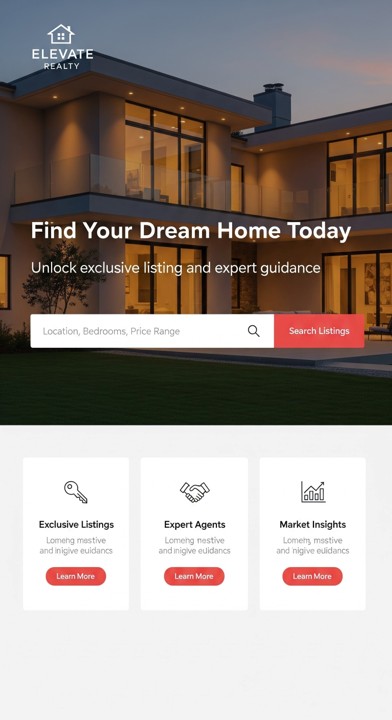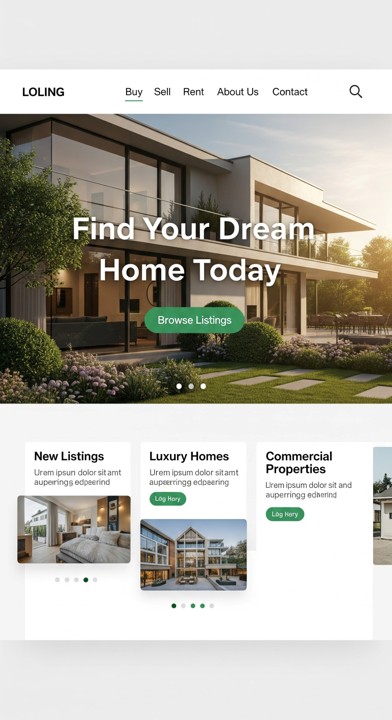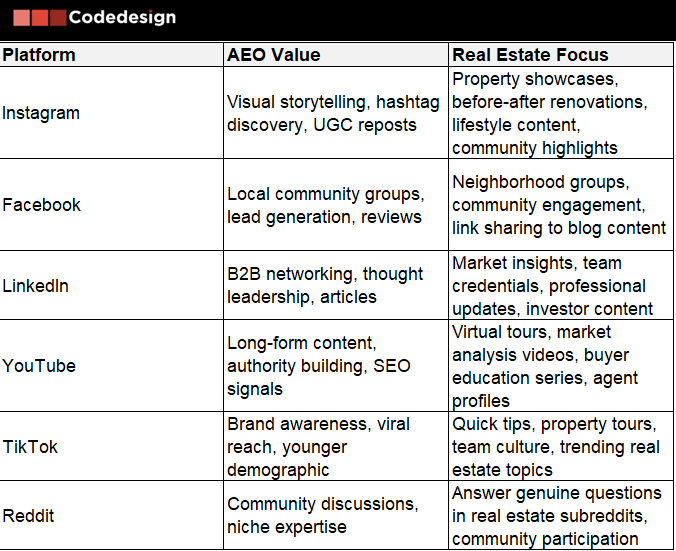18 min to read
To get your real estate business mentioned in AI-generated answers, it is crucial to adapt answer engine optimization (AEO) strategies above and beyond traditional SEO. AEO focuses on making your brand and content highly discoverable and authoritative for AI search platforms, zero-click environments, and conversational assistants. In real estate, visibility in AI responses translates into being the agent, agency, or property developer an AI system recommends or cites when users ask region-specific, intent-driven questions.
The Shift to Answer Engine Optimization in Real Estate
This year more than half of online searches end without a click. Platforms like ChatGPT, Perplexity, Gemini, and Google AI Overviews often deliver instant answers, bypassing traditional website visits. Not being mentioned in those responses means missing out on a huge portion of potential clients searching for real estate services, properties, or advice.
AEO extends SEO by helping your content become the trusted answer that AI surfaces first, crucial for real estate professionals aiming to stand out in crowded and locally competitive markets.
What is Answer Engine Optimization (AEO) for Real Estate?
Answer Engine Optimization is the process of structuring your real estate content so that AI-powered engines, voice assistants, and chatbots recognize, cite, and use your information as direct answers. This differs from traditional SEO, which focuses on ranking in search engine results, by prioritizing clear, structured, and trustworthy content AI models pull into conversational interfaces and instant answers.
Why Real Estate Businesses Must Prioritize AEO
- Changing Search Behavior: Buyers, sellers, and renters increasingly turn to AI-powered chatbots and voice assistants for fast, reliable property information and recommendations.
- Zero-Click Searches: Visibility means more than website traffic — if your real estate business isn't found in AI answers, competitors will capture those potential leads.
- Authority Signals: Reputation and trust matter; authoritative and well-cited real estate businesses secure mentions in AI-driven results more often.
Core Strategies to Get AI to Mention Your Real Estate Business
1. Understand Real Estate User Intent and Question Formats
AI platforms interpret what buyers, sellers, or renters want to know—whether it's "best agencies in Cascais", "tips for first-time homebuyers", or "current property prices in Lisbon". Structuring your content to answer these questions with clear intent (informational, transactional, navigational, commercial) increases the likelihood of mention.
2. Direct, Structured Answers for Real Estate Queries
- Start content with direct answers to common real estate questions.
- Use H2 or H3 headings for typical queries (“How to find luxury homes in Lisbon?” “What are the steps to selling my property?”).
- Add dedicated FAQ or Q&A sections relevant to your region, services, or property types.
- Bullet points and concise summaries make it easier for AI models to understand and surface your content.
3. Optimize Business Profiles and Directory Listings
AI platforms pull data from across the web, making accurate and consistent business profiles essential.
- Prioritize Google Business Profile, Apple Maps, Bing Places, and key real estate directories.
- Ensure NAP (Name, Address, Phone), photos, service descriptions, and reviews are accurate and current.
- Add categories such as “real estate agency,” “property consultant,” or “luxury home specialist” to improve relevance.
4. Become an Industry Authority
- Publish expert, well-cited blog content on real estate topics.
- Pursue mentions in respected third-party publications, industry roundups, and regionally influential sites.
- Contribute guest posts, research, interviews, or data-based insights on local market trends to increase backlinks and brand mentions.
- Consistency and quality build the trust needed for AI engines to refer your agency as a reliable source.
5. Utilize Schema Markup and Structured Data
Implementing schema markup (FAQ schema, local business schema, article schema) helps AI engines accurately interpret your real estate website’s information.
- Most modern SEO plugins offer integrated schema tools.
- Add “how-to” schema for guides (“How to buy a home in Portugal”) and FAQ schema for typical buyer/seller questions.
- Structured data increases your chances of appearing in “AI Overviews” and answer summaries.
6. Test and Monitor AI Search Visibility
Regularly audit how often your business appears in AI answers for local and niche searches.
- Use manual queries in ChatGPT, Perplexity, and Google AI Overviews with your brand and industry keywords.
- Track your visibility and iterate: update content formats, improve authority signals, and re-optimize based on gaps.
7. Encourage Customer Reviews and Third-Party Citations
AI models rely on reviews and external authority.
- Actively seek and manage customer testimonials across Google, Yelp, and specialized real estate review platforms.
- Incentivize positive reviews to boost signal strength, but maintain authenticity and transparency to avoid penalties.

Key Factors for ChatGPT and AI Recommendations in Real Estate
Successful AI-driven mentions typically hinge on:
- Brand mentions across the web
- Quality and quantity of customer reviews
- Keyword relevancy to specific real estate queries (property sales, rentals, market advice)
- Age and perceived trust of your brand
- Inclusion in curated lists (e.g., “top real estate agencies in Lisboa”)
- High-authority domain backlinks and consistent content quality

How to create AI ready Landing Pages for Real Estate?
Creating AI-ready landing pages for real estate goes beyond traditional conversion optimization. These pages must be structured to help AI platforms like ChatGPT, Perplexity, and Google AI Overviews discover, understand, and recommend your properties and services. Here's your comprehensive guide to building landing pages that perform in both traditional search and AI-driven environments.
Why Real Estate Needs AI-Ready Landing Pages
Over 60% of searches now end without a click. Buyers research properties, neighborhoods, and agents through AI-powered tools before ever visiting a website. AI-ready landing pages ensure your real estate business gets mentioned in those critical first interactions—when buyers are forming opinions and making shortlists.
Core Principles of AI-Ready Real Estate Landing Pages
Structured Content That AI Can Parse
AI systems rely on clear page structure to determine relevance and extract information.
Implementation:
- Use semantic HTML5 elements (
<header>,<main>,<section>,<article>) - Organize content with clear H1, H2, H3 heading hierarchy
- Keep paragraphs short (2-3 sentences maximum)
- Use bullet points and numbered lists for key features
- Include tables for pricing, property comparisons, or neighborhood statistics

Direct Answer Format
AI platforms favor content that directly answers user questions in the first 1-2 paragraphs.
Implementation:
- Start with a clear, direct answer to the main query
- Place the most important information "above the fold"
- Front-load property details, pricing, and location information
- Answer the "what," "where," "how much," and "why" immediately
Example Opening:
"This 4-bedroom oceanfront villa in Cascais is listed at €1.2 million and offers 250m² of living space, private pool, and panoramic Atlantic views. Located in the prestigious Monte Estoril neighborhood, it's 5 minutes from Cascais marina and 30 minutes from Lisbon airport."
Comprehensive Schema Markup Implementation
Schema markup is critical for AI discoverability. It helps AI platforms understand and categorize your real estate content accurately.
RealEstateListing Schema
- Property type (house, apartment, villa, land)
- Price and currency
- Number of bedrooms/bathrooms
- Square footage/square meters
- Availability status (for sale, for rent, sold)
- Date posted
- Property address with geographic coordinates
LocalBusiness Schema
- Agency name and contact information
- Office address and service areas
- Business hours
- Phone number and email
- Social media profiles
Place Schema
- Specific property location
- Neighborhood information
- City, postal code, coordinates
- Nearby amenities (schools, transport, shopping)
Organization Schema
- Real estate agency details
- Agent profiles and credentials
- Company reviews and ratings
Offer Schema
- Listing price or rental rate
- Special offers or incentives
- Financing options
- Availability dates
Review Schema
- Customer testimonials
- Agent ratings
- Property/agency reviews
Implementation Format:
Use JSON-LD format (Google's preferred method) in the <head> section of your landing page.
Location-Optimized Content
Real estate is inherently local. AI platforms prioritize location-specific information for property searches.
Implementation:
- Include city, neighborhood, and postal code throughout content
- Add geographic coordinates in schema markup
- Create dedicated landing pages for each neighborhood or city
- Include local amenities, schools, transport links
- Mention distance to key landmarks and city centers
- Use "Place" schema to define exact locations
Content Structure:
- Property location details in H2 or H3 headings
- Neighborhood overview section with bullet points
- Local market trends and pricing data
- Maps and geographic visualization
FAQ Sections for Common Buyer Questions
FAQ sections increase the likelihood of AI platforms citing your content when answering user queries.neilpatel.com-AEO-Answer-Engine-Optimization-How-to-Get-AI-Generator-to-Mention-my-Business-1.pdflanding
Real Estate FAQ Topics:
- "How much do homes cost in [neighborhood]?"
- "What's included in the property price?"
- "What are the property taxes in [city]?"
- "Is financing available for international buyers?"
- "What's the typical closing timeline?"
- "Are there HOA fees or maintenance costs?"
- "What schools are nearby?"
- "Is this property move-in ready?"
Implementation:
- Use FAQ schema markup with
@type: FAQPage - Structure each Q&A with Question and Answer schema types
- Keep answers concise (2-4 sentences)
- Link to detailed pages for complex topics

High-Quality Visual Elements with Descriptive Alt Text
AI systems increasingly analyze images and rely on alt text for context.
Implementation:
- Use descriptive, contextual alt text for all property images
- ❌ Bad: "IMG_1234.jpg"
- ✅ Good: "Modern kitchen with marble countertops and ocean view in Cascais villa"
- Add captions below images explaining what's shown
- Ensure images are crawlable (avoid JavaScript-only lazy loading)
- Use high-resolution professional photography
- Include virtual tour or video content with transcripts
Mobile-First, Fast-Loading Design
AI platforms consider page experience and mobile optimization when determining which content to surface.
Implementation:
- Responsive design that adapts to all screen sizes
- Page load time under 3 seconds
- Optimize image file sizes without sacrificing quality
- Use modern image formats (WebP)
- Minimize JavaScript and CSS bloat
- Implement lazy loading correctly (with HTML fallbacks)
- Test on multiple devices and browsers
Clear, Compelling Calls-to-Action (CTAs)
While CTAs drive conversions, they also signal to AI what action visitors should take, reinforcing your page's purpose.
Real Estate CTA Examples:
- "Schedule a Property Viewing"
- "Request a Virtual Tour"
- "Download Neighborhood Guide"
- "Get Pre-Qualified for Financing"
- "Contact an Agent"
- "Receive Price Updates"
Implementation:
- Place primary CTA above the fold
- Repeat CTAs throughout long-form content
- Use contrasting colors and clear button text
- Include phone number and click-to-call functionality
- Test CTA placement and wording regularly
Trust Signals and Social Proof
AI platforms consider authority and credibility when recommending businesses. Trust signals improve both conversion rates and AI recommendation likelihood.
Trust Elements for Real Estate:
- Client testimonials with names and photos
- Industry certifications and licenses
- Awards and recognition badges
- Number of properties sold or years in business
- Professional associations (NAR, local real estate boards)
- Media mentions and press coverage
- Review ratings from Google, Zillow, or local platforms
Implementation:
- Add Review schema markup to testimonials
- Display ratings prominently
- Include specific, detailed testimonials (not generic praise)
- Link to external review platforms
Dynamic Personalization Based on User Behavior
AI-powered landing pages adapt content based on visitor source, device, location, and behavior.
Personalization Strategies:
- Show different properties based on traffic source
- Google Ads for "luxury homes" → Show high-end listings
- Facebook Ads for "first-time buyers" → Show affordable properties
- Adjust messaging based on user location
- International visitors → Emphasize foreign buyer support
- Local visitors → Focus on neighborhood knowledge
- Dynamic text replacement for paid campaigns
- Behavioral targeting based on pages viewed or time on
Content That Answers Multiple User Intents
AI systems favor comprehensive content that addresses various aspects of a user's query.
Multi-Intent Content for Real Estate:
- Informational: Market trends, neighborhood guides, buying process
- Commercial: Property listings, pricing, comparisons
- Transactional: Contact forms, scheduling, application processes
- Navigational: Agent profiles, agency information, service areas
Implementation:
Structure landing pages with sections addressing each intent, using clear headings and jump links for easy navigation.

Regular Content Updates and Fresh Data
AI platforms prioritize current, up-to-date information.
Update Frequency:
-
Property status (available, under contract, sold) - Real-time
-
Pricing information - Weekly or as changed
-
Market statistics and trends - Monthly
-
Neighborhood information - Quarterly
-
Schema markup - Whenever content changes
Technical Implementation Checklist
Schema Markup:
-
RealEstateListing schema with all property details
-
LocalBusiness schema for agency information
-
Place schema for property location
-
FAQ schema for question sections
-
Review schema for testimonials
-
Offer schema for pricing and special offers
Content Structure:
-
Clear H1-H3 heading hierarchy
-
Direct answer in first paragraph
-
Short paragraphs (2-3 sentences)
-
Bullet points for features and benefits
-
Tables for comparisons or statistics
-
FAQ section with 8-10 questions
SEO & Technical:
-
Mobile-responsive design
-
Page load time under 3 seconds
-
Descriptive alt text on all images
-
Image captions where appropriate
-
Clean, semantic HTML5
-
Internal linking to related properties/pages
Trust & Conversion:
-
Clear CTAs above the fold and throughout page
-
Client testimonials with names
-
Trust badges and certifications
-
Contact information prominently displayed
-
Multiple contact methods (form, phone, email)
AI Optimization:
-
JSON-LD schema in
<head>section -
Content updated regularly
-
Location-specific information throughout
-
Multi-intent content coverage
-
Crawlable images and content (no JS-only rendering)
Tools for Building AI-Ready Real Estate Landing Pages
Schema Markup Tools:
- Google's Structured Data Markup Helper
- Schema.org documentation
- JSON-LD generators for real estate
Landing Page Builders with AI Support:
- Unbounce (AI optimization features)
- Swipe Pages (AI content generation)
- Instapage (AI testing)
- Outgrow (ChatGPT-integrated builder)
Testing & Validation:
- Google Rich Results Test
- Schema Markup Validator
- PageSpeed Insights (mobile performance)
- ChatGPT, Perplexity (manual AI visibility testing)

The Role of Social Media in AEO (Answer Engine Optimization) for Real Estate
Social media is no longer just a channel for engagement and lead generation in real estate—it has become a critical component of Answer Engine Optimization. AI platforms like ChatGPT, Perplexity, and Google AI Overviews rely on social signals, brand mentions, and user-generated content to determine which real estate agents, agencies, and properties deserve visibility in their generated answers. Real estate professionals who harness social media strategically can dramatically improve their chances of being recommended by AI systems.
Why Social Media Matters for Real Estate AEO
Brand Mentions Drive AI Visibility
AI systems are trained on data pulled from across the web, including social media platforms. Every mention of your real estate business on social channels—whether it's a tagged post, a client testimonial, or a recommendation—contributes to your AI visibility profile.
When multiple sources mention your brand positively, AI interprets this as social proof and credibility signals. The more places your agency or agents are discussed online, the more data AI models have to work with, increasing the likelihood of your name appearing in generated responses.
Real-World Impact:
A real estate agent mentioned across Instagram, LinkedIn, Facebook, and local business pages sends stronger AI signals than one mentioned only on their personal website.
Social Signals Influence Search Rankings and AI Recommendations
Search engines and AI platforms now analyze social engagement metrics directly. When your real estate content generates high engagement on social media—shares, likes, comments—these platforms interpret this surge as a trust signal, leading to faster indexing and higher visibility in both traditional and AI search.
Key Social Signals AI Monitors:
- Shares from authoritative or influential users (other agents, brokers, industry leaders)
- Engagement ratios (likes, comments relative to reach)
- Brand mentions across platforms
- Click-through rates from social posts to your website
- Time spent on your website by visitors who came from social
These signals help AI determine whether your real estate content offers genuine value and resonates with users.
User-Generated Content (UGC) as AI Authority Signals
User-generated content—client testimonials, reviews, property photos, and success stories shared on social media—carries significant weight for AEO. AI models are trained on public data from social platforms, forums, and review sites. When real clients share authentic experiences with your real estate services on social media, AI systems recognize this as more credible than branded marketing content.
Why UGC Matters for AEO:
- 90% of people are more likely to trust a brand when recommended by others, even strangers
- Authentic client stories build trust signals that AI systems prioritize
- Review platforms integrated into AI training data amplify the impact of client testimonials
Social Media Amplifies Your Content Reach
When your real estate blog posts, market insights, or property guides are shared across social media, they gain broader exposure. This increased reach leads to more backlinks, brand searches, and organic mentions—all essential for improving visibility in AI-generated answers.
Amplification Formula:
Social engagement → More visibility → More backlinks and mentions → Improved AI recommendation likelihood.
Strategic Social Media Tactics for Real Estate AEO
Create Share-Worthy, Answer-Ready Content
Develop content specifically designed to be shared on social media while also answering common real estate questions. AI systems favor content that directly addresses buyer and seller pain points.
Content Ideas for Social + AEO:
- Market trends and analysis for your region
- First-time homebuyer tips and guides
- Neighborhood highlights and community events
- Home staging and selling tips
- Local investment insights
- "How-to" content addressing common buyer questions
- Local tax information or financing guides
- Comparison posts ("Luxury vs. Mid-Range Homes in [City]")
Why This Works: When this content is shared widely on social, it signals relevance to AI systems and increases the likelihood of being cited.
Leverage Client Testimonials and Success Stories
Encourage satisfied clients to share their real estate journey on social media. Video testimonials, before-and-after photos, and written reviews all serve as powerful AEO signals.
Implementation Strategy:
- Ask clients for testimonials via email follow-up after transactions
- Encourage them to tag your business in posts
- Repost and celebrate their stories on your agency social channels
- Create hashtags specific to your agency for easy tracking
- Offer incentives (gift cards, discount on future services) for genuine reviews
- Share client success stories across multiple platforms
AEO Benefit: These authentic mentions from clients train AI models to recognize your agency as trustworthy and effective.
Build Local Expertise Visibility on Social
Position yourself or your agents as local experts by consistently sharing location-specific insights on social media. AI systems prioritize local knowledge when recommending real estate professionals.
Local Expertise Content:
- Monthly market reports for your city or neighborhood
- "Best Neighborhoods" insights
- School and amenities guides
- Investment trend analysis
- Property tax updates and legal changes
- Development news and neighborhood evolution
- Comparisons to neighboring cities or regions
AEO Impact: Local expertise demonstrated across social platforms increases mentions in queries like "best agents in [city]" or "real estate experts in [neighborhood]".
Diversify Across Multiple Platforms
Don't limit your social strategy to one platform. Different platforms contribute to AI training data in varying ways, and diversification expands your overall brand mention surface area.
Strategic Insight: Reddit discussions and community engagement are particularly valuable for AEO because AI models incorporate Reddit data into training sets, recognizing it as a source of nuanced, real user perspectives.
Encourage and Monitor Conversations About Your Brand
AI systems track brand mentions across social platforms. The more conversations happening about your real estate business, the stronger the AEO signal.
Strategies:
- Respond to every comment and message on social media
- Engage in real estate discussions and Q&A threads
- Ask questions that encourage followers to share their thoughts
- Create polls about neighborhood preferences or home buying concerns
- Start conversations around real estate trends and local news
- Tag industry partners, brokers, and influencers to expand reach and mentions
AEO Result: Active brand conversations signal relevance and engagement, which AI systems use to determine recommendation worthiness.
Build a Consistent Brand Identity Across Platforms
AI systems analyze how consistently your brand is presented across the web, including social media. Inconsistencies (different business names, contact info, descriptions) can confuse AI systems and reduce recommendation likelihood.
Consistency Checklist:
-
✅ Same business name across all platforms
-
✅ Consistent phone number and email
-
✅ Uniform service descriptions and specializations
-
✅ Coherent brand messaging and voice
-
✅ Aligned geographic service areas
Partner with Industry Influencers and Complementary Businesses
Mentions from trusted industry figures or complementary businesses carry more weight with AI systems. Real estate agents, mortgage brokers, interior designers, and local business owners can amplify your reach.
Partnership Ideas:
- Cross-promote content with mortgage brokers and financial advisors
- Collaborate with home designers and staging companies
- Feature local business owners in your social content
- Create joint guides (e.g., "First-Time Homebuyer's Guide" with a mortgage broker)
- Participate in industry roundtables or panels
AEO Benefit: Influencer mentions and cross-promotions train AI systems to recognize your agency as an industry authority.
Share Original Research and Data-Backed Insights
Create and share original market research, surveys, or data-backed insights on social media. AI systems highly value original, ungated content.
Content Examples:
- Quarterly market analysis reports
- Neighborhood price trend studies
- Buyer motivation surveys
- Seller preference research
- Investment potential analysis for specific areas
- Cost of living comparisons
Why It Works: Original, publicly available data attracts media coverage and citations, which AI systems use as credibility signals.
Use Strategic Hashtags for Topic Association
Hashtags help AI systems associate your content with specific topics and niches. Strategic hashtag use increases the likelihood of your posts appearing in AI responses for real estate queries.
Real Estate Hashtag Strategy:
- Location tags: #[City]RealEstate #[Neighborhood]Homes
- Topic tags: #FirstTimeHomeBuyer #LuxuryHomes #RealEstateInvesting
- Problem-solving tags: #RealEstateAdvice #HomeBuyingTips
- Branded tags: #[AgencyName]Homes #[AgentName]RealEstate
How Social Media and AEO Work Together for Real Estate
The AEO Social Flywheel:
- Create High-Quality Content answering real estate questions
- Share Across Social Platforms with proper hashtags and descriptions
- Encourage Social Engagement through comments, shares, and user-generated content
- Build Brand Mentions across multiple platforms and communities
- Strengthen Authority through client testimonials and influencer partnerships
- Improve AI Visibility as AI systems detect your consistent, credible presence
- Generate More Leads as AI recommends your services in generated answers
Measuring Social Media's Impact on Real Estate AEO
Key Metrics to Track:
- Social Engagement Rate: Shares, comments, and mentions of your real estate business
- Brand Mention Volume: How often your agency or agents are mentioned across social platforms
- UGC Volume: Number of client testimonials, reviews, and photos posted on social
- Referral Traffic from Social: Website visitors coming from social media posts
- AI Visibility: How often your business appears in ChatGPT, Perplexity, or Google AI Overview responses
- Search Visibility: Organic visibility for your target real estate keywords
- Social Media Followers: Growth rate of engaged followers in your target market
Tools for Monitoring:
- Brand Radar (Ahrefs) for brand mention tracking
- ChatGPT, Perplexity (manual testing for AI mentions)
- Google Analytics for social referral traffic
- Social media native analytics (Instagram Insights, Facebook Analytics)
- Google Search Console for search visibility
- Reputation monitoring tools (Trustpilot, Google My Business)
Real Estate AEO Social Media Best Practices
Do:
-
✅ Share client success stories and testimonials regularly
-
✅ Create location-specific content and insights
-
✅ Engage authentically with your audience and community
-
✅ Maintain consistency across all social platforms
-
✅ Post original research and data-backed insights
-
✅ Encourage clients to tag and mention your business
-
✅ Use descriptive captions that include real estate keywords
Don't:
-
❌ Rely on a single social media platform
-
❌ Post only property listings without educational content
-
❌ Use vague or generic hashtags
-
❌ Ignore client comments or messages
-
❌ Publish contradictory information across platforms
-
❌ Gate valuable content (AI systems can't see paywalled content)
Social media is no longer a separate marketing channel for real estate—it is a fundamental component of Answer Engine Optimization. By creating share-worthy content, encouraging authentic client testimonials, building consistent brand visibility, and strategically engaging across multiple platforms, real estate professionals exponentially increase their chances of being mentioned and recommended by AI systems.
The agents and agencies that master the intersection of social media and AEO will dominate AI-driven discovery in 2025 and beyond. Every post, mention, and client testimonial contributes to your digital reputation that AI systems analyze to decide whether to recommend you. In the age of AI search, your social media strategy is your AEO strategy.
FAQs: Real Estate-Specific AEO (25 Questions we get asked all the time)
Understanding AEO and Real Estate Fundamentals
1. What is AEO (Answer Engine Optimization) for real estate?
AEO is the process of optimizing your real estate content so AI-powered platforms like ChatGPT, Perplexity, Gemini, and Google AI Overviews cite your business as a trusted answer. It focuses on structured, clear answers that help AI systems recommend your agency, agents, or properties when users ask real estate questions.
2. How is AEO different from traditional SEO for real estate agents?
SEO focuses on ranking your website on search engine results pages. AEO focuses on getting your content pulled directly into AI-generated responses—zero-click environments where users may never visit your website. Both are important, but AEO requires more structured, question-answer formatted content.
3. Why do real estate agents need to focus on AEO in 2025?
Over 60% of searches now end without a click. Users increasingly turn to AI to find recommendations, market insights, and property information. If your agency isn't mentioned in those AI responses, you're invisible to a massive audience of potential buyers and sellers.
4. What real estate queries benefit most from AEO optimization?
Location-based questions ("Best real estate agencies in Lisbon"), buyer education ("First-time homebuyer tips in Portugal"), market analysis ("Current property prices in Cascais"), agent recommendations ("Luxury home specialists near me"), and transactional queries ("How to sell my apartment") all benefit from AEO.
5. How does AI determine which real estate business to recommend?
AI systems evaluate six key factors: brand mentions across the web, quality and volume of reviews, keyword relevancy to the query, age and trust of your brand, inclusion in best-of lists or curated roundups, and authority signals like high-quality backlinks.
6. How do I get my real estate business mentioned in ChatGPT responses?
Focus on building authority through consistent brand mentions, gathering genuine customer reviews across third-party platforms, publishing high-quality market insights, updating all business directory listings, and structuring your website content with clear, question-answer formats.
7. What's the fastest way to improve my real estate business's AI visibility?
Start by optimizing your Google Business Profile, Yelp, Apple Maps, and other directory listings with accurate NAP (name, address, phone), photos, and reviews. Then audit which of your pages already appear in AI results and prioritize strengthening those with better authority signals.
8. Should I create different content for AI search versus traditional Google search?
Not necessarily. Structuring content for AI (clear headings, direct answers, bullet points) also improves traditional SEO. However, AI search favors more conversational, question-based formats, so adapt your content to answer specific questions your buyers and sellers ask.
9. How important are customer reviews for real estate AEO?
Very important. Reviews are one of the top six factors AI uses to recommend businesses. Focus on gathering genuine reviews across Google, Yelp, Zillow, real estate directories, and industry-specific platforms. Quality and volume both matter.
10. Can I speed up AEO results by using paid ads?
Paid ads don't directly influence AI recommendations, but they can increase brand visibility and drive traffic to your optimized content. The real gains come from building authority through organic mentions, reviews, and high-quality content.
11. What type of real estate content performs best in AI responses?
Content that directly answers common questions performs best. Blog posts about "How to buy a home in Portugal," guides for "First-time homebuyer mistakes," market analysis on "Property prices in Cascais 2025," and FAQ sections all work well for AI visibility.
12. How should I structure real estate blog posts for AEO?
Start with a direct answer to the main question in the first 1-2 paragraphs. Use H2 or H3 headings for related questions. Include a dedicated FAQ section addressing common follow-ups. Use bullet points, concise summaries, and short paragraphs to help AI parse your content accurately.
13. Should real estate agents focus on local AEO strategies?
Absolutely. Location-based queries are critical in real estate. Optimize for "best agents in [city]," "property listings in [neighborhood]," and local market insights. Your business profiles in directories and local SEO matter just as much as your website content.
14. How do I optimize my real estate website for AEO?
Ensure your site clearly answers common buyer and seller questions. Use FAQ schema markup, article schema, and local business schema. Keep your content updated, structure it with clear headings and direct answers, and include location-specific information throughout.
15. What real estate topics should I create content around for AEO?
Focus on topics your potential clients ask: "How to buy a home," "Selling your property in [region]," "Current market trends," "First-time buyer tips," "Home valuation methods," "Mortgage pre-approval," "Neighborhood guides," and "Common real estate mistakes." These are all commonly asked in AI search.
16. How do I build authority as a real estate business for AI?
Publish expert-led content consistently, earn mentions and backlinks from respected real estate publications and industry sites, contribute guest posts or data-driven insights to third-party platforms, respond to real estate questions on forums like Reddit, and maintain high-quality business listings across all directories.
17. What role do backlinks play in real estate AEO?
Backlinks signal authority to AI systems. Earn them by creating valuable market research, publishing guides, and building relationships with real estate journalists, bloggers, and industry sites. High-authority backlinks are weighted more heavily than low-quality ones.
18. How can I get my real estate content cited by AI platforms?
Create original, data-backed insights (market analysis, pricing trends, buyer surveys). Make your content easy to cite by including clear, quotable statistics and expert perspectives. Promote your content to industry publications and directories so AI tools discover and reference it.
19. Does the age of my real estate business matter for AEO?
Yes, older, more established brands tend to be trusted more by AI models. However, newer agencies can overcome this by quickly building authority through reviews, publications, and earning mentions in industry roundups and best-of lists.
20. How do I manage my online reputation for AEO success?
Monitor where your brand is mentioned across the web. Respond to reviews (both positive and negative) professionally. Correct inaccuracies on business listings and directories. Maintain consistency in how your business is described across platforms to reduce AI confusion and hallucinations.
21. What schema markup should my real estate website include?
Implement LocalBusiness schema (for agency info), Agent schema (for individual agents), Article schema (for blog posts), FAQ schema (for common questions), and HowTo schema (for guides like "How to sell your home"). These tags help AI systems understand and extract your content accurately.
22. How do I monitor whether my real estate business appears in AI search results?
Manually test queries in ChatGPT, Perplexity, and Google AI Overviews using branded and non-branded real estate terms. Track results in a simple spreadsheet. Use tools like Ubersuggest or Profound to audit your visibility across AI platforms. Check monthly to identify gaps and opportunities.
23. How often should I update my real estate content for AEO?
Update content regularly—especially market-sensitive information like pricing, interest rates, and local trends. Refresh blog posts every 3-6 months. When you notice your content is no longer appearing in AI results, re-optimize by clarifying structure, updating data, or improving authority signals.
24. What real estate directory listings are most important for AEO?
Prioritize Google Business Profile (essential for local AI), Yelp, Apple Maps, Bing Places, Zillow, Redfin, Rightmove (if in Europe), and industry-specific real estate directories. Ensure consistency across all platforms—accurate NAP, descriptions, photos, and reviews.
25. What metrics should I track to measure real estate AEO success?
Track: (1) how often your brand appears in AI responses for target queries, (2) review volume and ratings across platforms, (3) directory listing accuracy and completeness, (4) backlink growth from real estate publications, (5) content freshness and updates, and (6) search visibility trends across AI tools over time.
AI is fundamentally changing how buyers and sellers find real estate professionals, properties, and market intelligence. Real estate businesses must act now to adapt content, enhance authority, and master structured profiles if they want AI engines to select them as trusted answers. By combining AEO strategies with ongoing SEO, your business will remain visible, trusted, and prominent—even as the landscape shifts to zero-click and conversational search.




Add comment ×